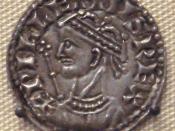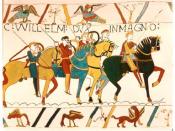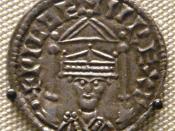Medieval England was in thrall to the powerful, French-speaking elite installed by William the Conqueror from 1066. As land-owning lords, the Normans dominated politically and economically, building grandiose castles to symbolise their strength. So how did England preserve its emerging national identity despite this crushing new influence?
National Identity
Writers in England in the twelfth century displayed national prejudices with no sign of shame. For the mid-twelfth-century author of the Deeds of King Stephen, Scotland was a potentially wealthy land, but its inhabitants were brutal, barbaric, and 'filthy'. The English could be equally unpopular with others, and were also criticised by their own: 'the English are noted among foreigners for their persistent drinking' wrote the learned John of Salisbury. Such a capacity to identify and contrast peoples by distinguishing characteristics is a feature of a sense of national identity.
Yet such developing views are the more striking because England had been conquered twice in half a century, in 1016 by the Scandinavian Cnut, in 1066 by the Norman William the Conqueror. For much of the next century and a half England, and to a lesser extent the rest of the British Isles, would remain part of an assemblage of lands spanning the English Channel. And if the assemblage had a centre, that centre was Rouen, in Normandy.
How, then, did the identity of the English emerge, given the imposition in 1066 of a continental governing class? Some, such as William the Conqueror's archbishop of Canterbury, said they hoped to learn to be Englishmen. However, such immediate and deliberate adoption of a culture - even if it was whole-hearted - appears uncommon. Rather the assimilation was more gradual, and had many causes of which the following are just three. In part, assimilation resulted from aristocratic families dividing their...


